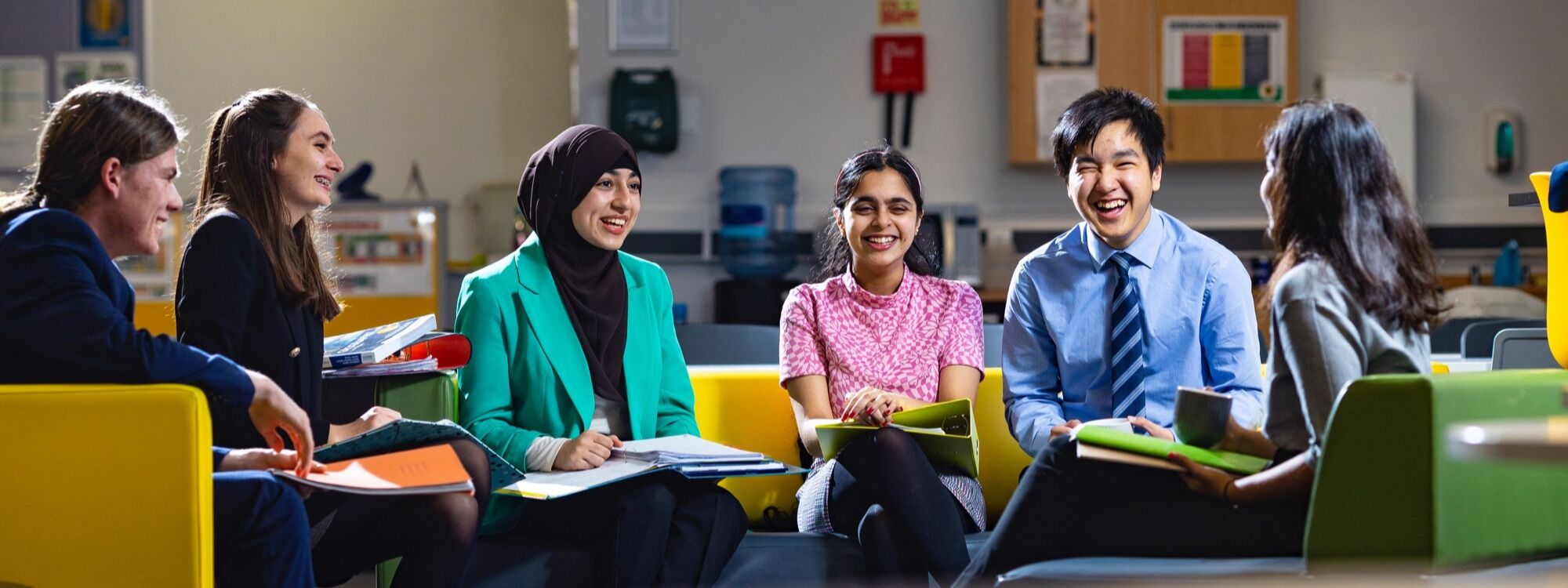- Home
- About Us
- Equality Objectives
Equality Objectives
Burnham Grammar School Mission Statement
This Scheme builds on the core values and ethos of Burnham Grammar School especially those promoting equality, celebrating diversity, challenging discrimination and celebrating our diversity.
What is Equality?
Equality is the principle of equal treatment for all people irrespective of their gender, ethnicity, disability, religious beliefs, sexual orientation, age, or any other recognised area of discrimination.
What is Diversity?
Diversity is the acceptance that we are all different but we are all equal. Diversity focuses on valuing and celebrating the strengths in people’s differences.
| The philosophy of our school values the individuality of all. We are committed to providing every opportunity to achieve the highest of standards. Within this ethos of achievement, we do not tolerate bullying and harassment. We actively tackle discrimination due to Disability, Gender, Race, Sexual Orientation, Religion Belief/Non-belief, Gender Re-assignment and Pregnancy and Maternity and promote equal opportunities and good relations between and amongst all, including all protected groups defined in the Equality Act 2010. We aim to ensure that the school promotes and accepts the individuality of all, irrespective of Disability, Gender, Race, Sexual Orientation, Religion Belief/Non-belief, Gender Reassignment and Pregnancy and Maternity or background. We are committed to ensuring that positive action is taken where necessary to redress the balance of inequality that may exist. We aim to reflect the diversity of our both our school and local community and society and ensure that the education we offer fosters positive attitudes to all people. |
The Burnham Grammar School
Equality Objectives 2024-26 are as follows:
Objective 1
Promoting Critical Thinking and Information Literacy
Enhance students' ability to critically evaluate information sources, identify and refute conspiracy theories, and utilise algorithms for informed decision-making.
Objective 2
Equip staff with the confidence, appropriate vocabulary, and phrases necessary to effectively challenge misogynistic, racist, disablist or inappropriate language.
Objective 3
Empowering Student Aspirations and Engagement
Increase student engagement and aspirations through mentoring, career talks, and targeted support for specific groups with significant disadvantage or protected characteristics.
Objective 4
Fostering Inclusivity and Addressing Language and Cultural Sensitivity with students
Promote inclusivity, address language and cultural sensitivity issues, and empower students to challenge discriminatory behaviour.
Objective 5
EAL and EAL Literacy Action Plan
Please find below the link to the BGS Equality, Diversity and Inclusion Objectives 2024-2026 and further information relating to these:
BGS Equality Diversity and Inclusion Objective 2024-2026
How does Equality, Diversity and Inclusion fit into BGS Aims and Ethos?
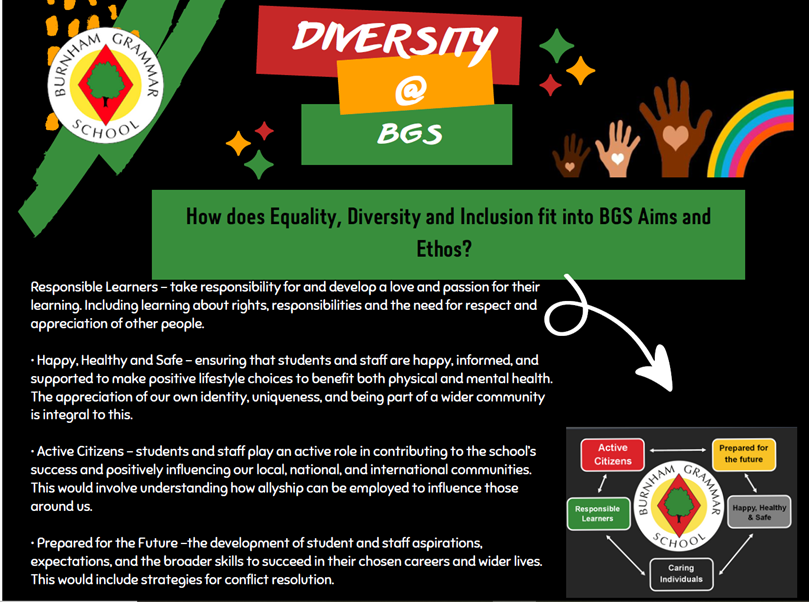
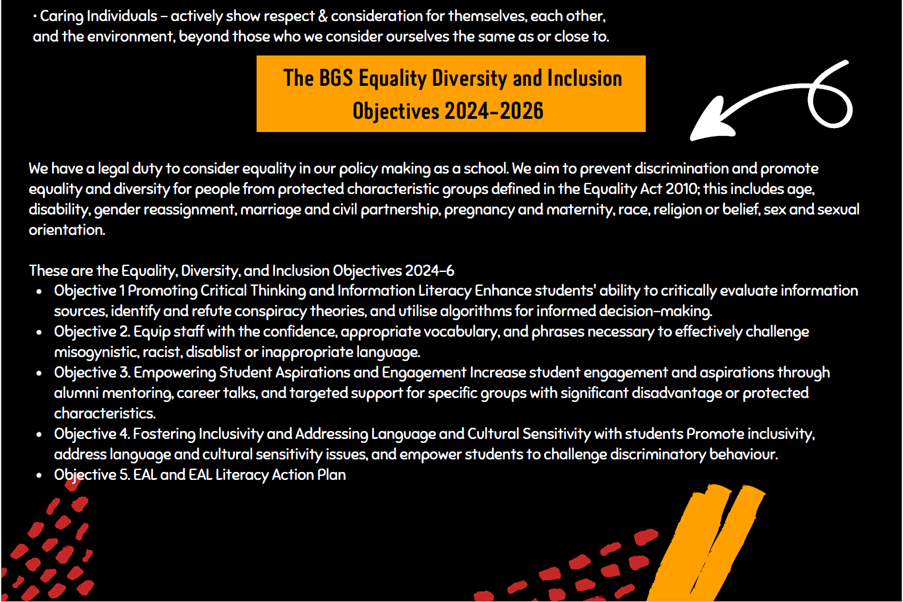
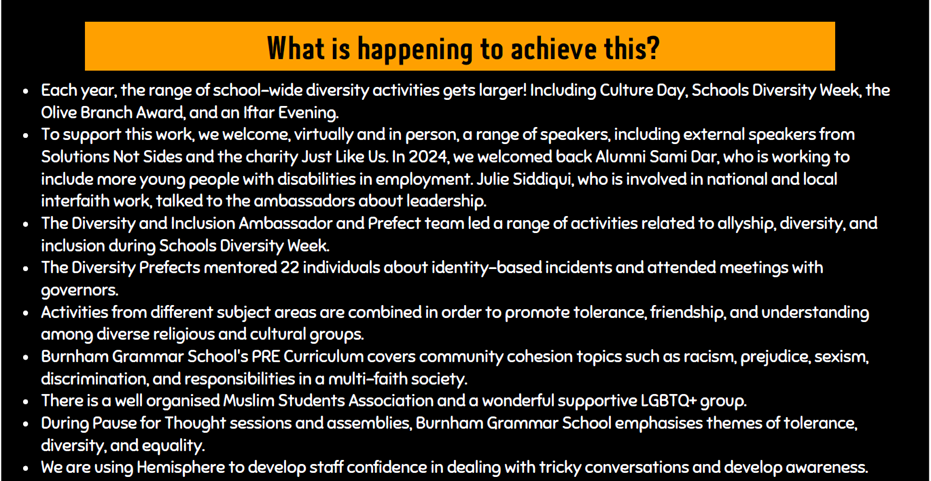
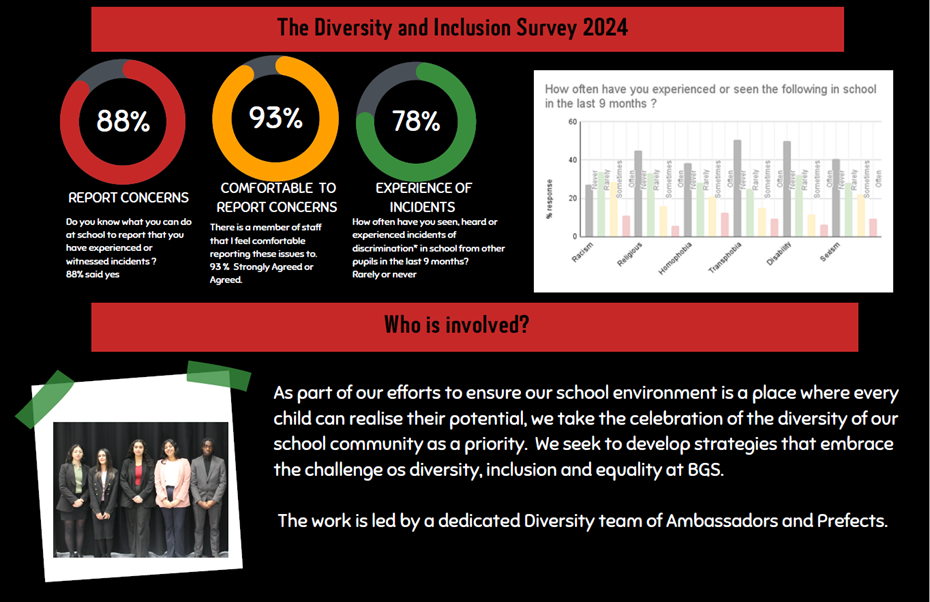
What progress are we making?
Equality Objectives: Key Progress from previous Objectives 2023-24
We are pleased to report progress upon Objective 1: to review and publicise the routes for students to report equality concerns achieved by reviewing and publicising the ways in which students can report concerns.
Based on data from Ofsted, the Diversity Survey, and Student Voice from the Inclusion Report, students are clear about expectations and reporting methods.
Increased Awareness: Awareness of reporting procedures has seen dramatic improvement, from 16.7% in 2021 to 97.0% in 2022, stabilising at 88.8% in 2024. This indicates effective communication about the various methods for reporting concerns, including anonymous options through the Respect/Report Concerns button and peer support through Diversity Prefects and the School Council.
This year, 93% of students from the survey said they feel comfortable reporting concerns to someone, demonstrating the effectiveness of our reporting channels, including anonymous options and peer support through Diversity Prefects.
On Objective 2, significant progress has been made: to raise awareness of the inappropriateness, offence and harm caused by both the insulting and routine use of sexist, misogynistic and homophobic language and slang.
Survey indicates that this is established from a school perspective; e.g., the Ofsted survey indicates school is clear on it being inappropriate and why it is inappropriate.
Perception of Language Issues: The increase in comfort with reporting such issues, coupled with greater awareness of reporting routes, suggests progress in understanding the harm caused by inappropriate language, though incidents still need to be addressed. Robust pastoral and safeguarding monitoring indicates where there are issues, including the new behaviour data breakdown.
There is a range of evidence to support the significant progress we have made towards Objective 3: to train all students on how to be an Ally in order to be prepared for adult life and be equipped with the skills, assertiveness and vocabulary to recognise their own unconscious bias and challenge discriminatory behaviour and language in all situations.
The Diversity and Inclusion programme has effectively equipped students with the skills to be allies, providing them with the tools to address unconscious bias and challenge discriminatory behaviour.
Work has been completed on embedding referral process referred by Heads of House and mentoring delivered by Diversity Prefects. Consultation resulted in improvement of resources and action from Prefects/ and ambassadors. This has in turn raised awareness of the offensive and harmful nature of sexist, misogynistic, and homophobic language and terminology. This year, 22 students were mentored by Diversity Prefects, showcasing the program’s impact as there has been only one student repeating a incident within the year.
The involvement of Diversity Ambassadors in events like Pause for Thought, Culture Day, and Schools Diversity Week has significantly raised the profile of diversity initiatives within the school and reinforced the school aims of developing students as caring individuals and active citizens. Student voice supports this as a success.
Some progress has been made upon Objective 4: raising staff awareness of the impact of students’ racial, religious and cultural backgrounds on their lived experience and challenges.
Schools Diversity Week resources and Insight information provided the opportunity to share student testimony about their lived experiences and to ensure that Diversity is visible. Culture Day 2024 successfully provided opportunities to share and celebrate diversity within the student body. The Iftar evening provided an opportunity to share students experiences with non-muslim members of staff (10 staff members attended).
Improved Staff Awareness: Increased comfort with reporting issues and higher awareness of procedures indirectly reflect improved staff understanding of the impact of students’ racial, religious, and cultural backgrounds as evidenced in staff voice.
Some progress has also been made on Objective 5: our monitoring systems effectively track the attainment and attendance of Pakistani males, ensuring that barriers to progress are identified and addressed on a student-by-student basis through pastoral and academic tracking.
Progress outside the objectives
The Diversity and Inclusion Programme’s training has effectively prepared students to handle discriminatory language and behaviour, contributing to a more inclusive school environment. The growth in the LGBTQ+ and Allies group, which now benefits from a designated safe space, and the active involvement of the Muslim Students Association in organising events and fundraising further highlight the programme’s success in fostering inclusivity.
Staff diversity has significantly increased, with 31% of our 130 staff members now belonging to minority ethnic groups, up from 17% in September 2020. The workforce is composed of 75.3% female and 41.6% male staff, reflecting our commitment to creating a diverse and supportive environment. Ongoing staff training continues to enhance understanding of the impact of students’ backgrounds, contributing to a more inclusive atmosphere.
Incidents Overview: In the 2023 academic year, reported incidents of bullying decreased from 10 to 5, with cyberbullying and persistent verbal harassment being the primary concerns. The Year 7 cohort showed the highest number of incidents, though these were addressed effectively through targeted interventions.
Anti-Bullying Initiatives: Significant efforts have been made in bullying prevention, particularly during the primary-to-secondary transition, leading to improved understanding of bullying and reporting mechanisms among students. The school received accreditation from the Bullying Intervention Group (BIG) for its effective strategies.
You can view our latest Equality, Diversiry & Inclusion Policy on the policies page of our website:
Burnham Grammar School : Policies
